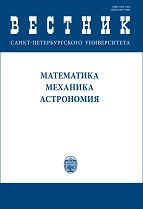|
This article is cited in 1 scientific paper (total in 1 paper)
MATHEMATICS
On the space of Schwartz operators in the symmetric Fock space and its dual
G. G. Amosovabcd, E. L. Baitenoveac
a Steklov Mathematical Institute of RAS,
8, ul. Gubkina, Moscow, 119991, Russian Federation
b St Petersburg State University, 7–9, Universitetskaya nab., St Petersburg, 199034, Russian Federation
c Moscow Institute of Physics and Technology,
9, Institutskii per., Dolgoprudny, Moscow region, 141701, Russian Federation
d Institute of Mathematics with Computer Center of the Ufa Science Center of RAS,
112, ul. Chernyshevskogo, Ufa, 450008, Russian Federation
e P. G.Demidov Yaroslavl State University,
14, ul. Sovetskaya, Yaroslavl, 150003, Russian Federation
Abstract:
A long-standing problem that arises when constructing the mathematical apparatus of quantum mechanics is the need to work with unbounded operators. Since the space of nuclear operators is preconjugate for the algebra of all bounded operators, we can consider the states of a quantum system as nuclear operators, and consider bounded operators as observables. In this case, taking the trace for the product of a nuclear operator (a quantum state) and a bounded operator (a quantum observable) gives the average value of a quantum observable in a fixed state. The existence of such an average for unbounded operators is not guaranteed. If we want to define a space of observables that includes such naturally occurring unbounded operators as the position and momentum operators, for which average values are always determined, we should consider a space of states smaller than all nuclear operators. Recently, this approach has been mathematically correct implemented in the Hilbert space $\mathcal{H} = L^2(\mathbb{R}^N)$. The so-called space of Schwarz operators, equipped with a system of semi-norms and being a Frechet space, was chosen as the space of states. Schwarz operators appeared to be integral operators whose kernels are functions belonging to the usual Schwarz space. The dual space to the space of Schwarz operators should be considered as the space of quantum observables and it really includes such standard observables as polynomials from the products of the position and momentum operators. In the present work we transfer this approach to the symmetric Fock space $\mathcal{H} = F(\mathfrak{H})$ over an infinite dimensional separable Hilbert space $\mathfrak{H}$. We introduce the space of Schwartz operators in $F(\mathfrak{H})$ over an infinite dimensional separable space $\mathfrak{H}$ and investigate which of the standard operators of quantum white noise belong to the space dual to the space of Schwartz operators.
Keywords:
the space of Schwartz operators, the symmetric Fock space, quantum white noice.
Received: 18.10.2021
Revised: 28.11.2021
Accepted: 02.12.2021
Citation:
G. G. Amosov, E. L. Baitenov, “On the space of Schwartz operators in the symmetric Fock space and its dual”, Vestnik of Saint Petersburg University. Mathematics. Mechanics. Astronomy, 9:2 (2022), 193–200; Vestn. St. Petersbg. Univ., Math., 9:2 (2022), 193–200
Linking options:
https://www.mathnet.ru/eng/vspua1 https://www.mathnet.ru/eng/vspua/v9/i2/p193
|

| Statistics & downloads: |
| Abstract page: | 110 | | Full-text PDF : | 19 | | References: | 16 |
|



 Contact us:
Contact us: Terms of Use
Terms of Use
 Registration to the website
Registration to the website Logotypes
Logotypes